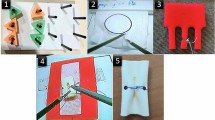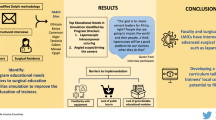Abstract
Introduction
The use of laparoscopy in resource-restricted countries has increased in recent years. Although simulation is now considered an important adjunct to operating-room-based training for learning laparoscopic skills, there is very little literature assessing the use of simulation in resource-restricted countries. The purpose of this study was to determine the feasibility and impact of a 3-day Fundamentals of Laparoscopic Surgery (FLS) course in Botswana, Africa.
Methods
A total of 20 surgeons and trainees participated in a 3-day FLS course. A pretest FLS score was obtained for each subject, followed by 2 days of practice with feedback. A final FLS posttest score was then obtained. Participants also watched the FLS instructional CD-ROM and took the written test on day 3.
Results
Mean posttest scores were significantly higher than pretest scores for each FLS task and for the total normalized FLS simulator score (285 ± 94 versus 132 ± 92, p < 0.001). The mean score on the written test was 242 (116). In total, only two surgeons achieved a passing score on both the cognitive and skills assessment required to obtain FLS certification.
Conclusion
To our knowledge, this is the first time the FLS program has been taught in Africa. We have shown that giving the FLS course in a resource-restricted country is feasible and resulted in a significant improvement in FLS technical skills after 3 days. Most surgeons, however, still did not reach FLS passing scores, indicating that more than 3 days will be required in future courses to help surgeons obtain FLS certification.


Similar content being viewed by others
References
Murphree S, Dakovic S, Mauchaza B, Raju V (1993) Laparoscopic cholecystectomy in Zimbabwe: initial report. Cent Afr J Med 39:85–88
Tsega E (1989) Laparoscopic evaluation of ascites and other abdominal conditions in Ethiopia. Trop Geogr Med 41:341–345
Raiga J, Kasia JM, Bruhat MA (1999) Laparoscopic surgery in the Cameroon. Int J Gynaecol Obstet 65:65–66
Bendinelli C, Leal T, Moncade F, Dieng M, Toure CT, Miccoli P (2002) Endoscopic surgery in Senegal. Benefits, costs and limits. Surg Endosc 16:1488–1492
Baraza R (2005) Laparoscopic cholecystectomy at the Nairobi Hospital: a personal experience with 42 cases. East Afr Med J 82:473–476
Bokazhanova A, Rutherford GW (2006) The epidemiology of HIV and AIDS in the world. Coll Antropol 30(Suppl 2):3–10
Schietroma M, Carlei F, Lezoche E, Agnifili A, Enang GN, Mattucci S, Minervini S, Lygidakis NJ (2001) Evaluation of immune response in patients after open or laparoscopic cholecystectomy. Hepatogastroenterology 48:642–646
Reznick RK, MacRae H (2006) Teaching surgical skills—changes in the wind. N Engl J Med 355:2664–2669
Seymour NE, Gallagher AG, Roman SA, O’Brien MK, Bansal VK, Andersen DK, Satava RM (2002) Virtual reality training improves operating room performance: results of a randomized, double-blinded study. Ann Surg 236:458–463
Peters JH, Fried GM, Swanstrom LL, Soper NJ, Sillin LF, Schirmer B, Hoffman K (2004) Development and validation of a comprehensive program of education and assessment of the basic fundamentals of laparoscopic surgery. Surgery 135:21–27
Fundamentals of Laparoscopic Surgery (2008) Available from http://www.flsprogram.org/. Cited 4 Feb 2008
Derossis AM, Fried GM, Abrahamowicz M, Sigman HH, Barkun JS, Meakins JL (1998) Development of a model for training and evaluation of laparoscopic skills. Am J Surg 175:482–487
Derossis AM, Bothwell J, Sigman HH, Fried GM (1998) The effect of practice on performance in a laparoscopic simulator. Surg Endosc 12:1117–1120
CIA World Factbook (2008) Available from https://www.cia.gov/library/publications/the-world-factbook/geos/bc.html. Cited 20 May 2008
Fraser SA, Klassen DR, Feldman LS, Ghitulescu GA, Stanbridge D, Fried GM (2003) Evaluating laparoscopic skills: setting the pass/fail score for the MISTELS system. Surg Endosc 17:964–967
Scott DJ, Ritter EM, Tesfay ST, Pimentel EA, Nagji A, Fried GM (2008) Certification pass rate of 100% for fundamentals of laparoscopic surgery skills after proficiency-based training. Surg Endosc 22:1887–1893
Moulton CA, Dubrowski A, MacRae H, Graham B, Grober E, Reznick R (2006) Teaching surgical skills: what kind of practice makes perfect? A randomized, controlled trial. Ann Surg 244:400–409
Apostolou C, Panieri E (2007) National survey of surgeons’ attitudes to laparoscopic surgical training in South Africa. S Afr J Surg 45:86, 88, 90–86, 88, 91
Fried GM, Feldman LS, Vassiliou MC, Fraser SA, Stanbridge D, Ghitulescu G, Andrew CG (2004) Proving the value of simulation in laparoscopic surgery. Ann Surg 240:518–525
Vassiliou MC, Ghitulescu GA, Feldman LS, Stanbridge D, Leffondre K, Sigman HH, Fried GM (2006) The MISTELS program to measure technical skill in laparoscopic surgery: evidence for reliability. Surg Endosc 20:744–747
McCluney AL, Vassiliou MC, Kaneva PA, Cao J, Stanbridge DD, Feldman LS, Fried GM (2007) FLS simulator performance predicts intraoperative laparoscopic skill. Surg Endosc
Derossis AM, Antoniuk M, Fried GM (1999) Evaluation of laparoscopic skills: a 2-year follow-up during residency training. Can J Surg 42:293–296
Acknowledgements
We are grateful to both Covidien and Ethicon for donated materials and to Lisa Jukelevics from SAGES for her continued help and support throughout this project.
Author information
Authors and Affiliations
Corresponding author
Rights and permissions
About this article
Cite this article
Okrainec, A., Smith, L. & Azzie, G. Surgical simulation in Africa: the feasibility and impact of a 3-day fundamentals of laparoscopic surgery course. Surg Endosc 23, 2493–2498 (2009). https://doi.org/10.1007/s00464-009-0424-4
Received:
Revised:
Accepted:
Published:
Issue Date:
DOI: https://doi.org/10.1007/s00464-009-0424-4




